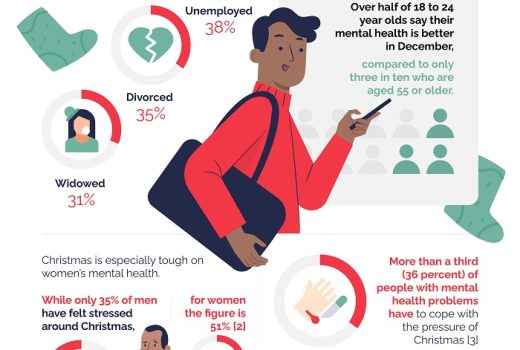The Christmas season is often associated with carol singers, festive lights, the tantalizing prospect of snow, and is looked forward to as a time to spend with family and close friends. However, whether or not Christmas is your favourite time of the year, many will be able to understand why a large proportion of people find it stressful or anxiety-inducing.
Christmas-related stress and anxiety can contribute to a serious decline in mental well-being over the short term, or longer, which can have lasting negative impacts. [1] Whatever the cause of those anxieties or stresses, there are things that can be done to mitigate their impact of them on your mental well-being.
The financial expenditure on food and presents can make December, and the Christmas period, the most expensive time of the year for many people. It can lead to people dipping into savings, building up unwanted debt, or relying on borrowed money from family or friends.
The prospect of paying back that money can lead to lots of anxiety, and money-related concerns are top of the list when it comes to stress in the UK. [2]
Sometimes, the best way to avoid those stresses is to minimize the impact of the Christmas season on expenditure by reducing it all together or spreading it over a longer time frame.
There are several creative ways to lessen financial pressure during the Christmas season. One way is to reduce the number of presents you buy by organising a secret Santa among family or friends.
A long list of presents can be daunting, and it can be hard to decide what to get for people when there are so many gifts to buy. By arranging to get presents for one person, you’re not only reducing your financial expenditure, but you also make it easier to focus on choosing a great gift. That way, everyone involved in the secret Santa can receive presents which have more thought put into them, and spend less money while they’re at it.
On top of presents, food and drink can end up taking a significant chunk out of the Christmas budget, but it doesn’t have to be as expensive as you might think. Often alcoholic beverages can end up costing just as much, if not more, than the food.
To avoid over-spending on too much booze, set yourself a reasonable budget for alcoholic drinks and stick to it. This sounds easy but in practice, it can be hard. [3]
If you manage to be disciplined, however, and limit how much you purchase, you could see a noticeable difference in how much you spend. In place of the alcohol, you could try and make some festive cocktails that are cheaper, and don’t come with the threat of a nasty hangover.[4]
They can also help prevent excessive drinking over the Christmas period, which can have its own negative implications for mental well-being. By turning away from the booze, you can reduce your financial pressure, and protect your mental well-being while making a positive change for your health.
By following these steps, you can lessen your anxiety about financial pressures and protect your mental well-being over the Christmas period. However, financial concerns aren’t the only source of Christmas related anxiety and stress.
If Christmas is daunting for another reason, take a look at the accompanying infographic to see more practical tips on how to mitigate against stress and anxiety, maintain your mental well-being, and enjoy your Christmas period as much as possible.
Below, you can view the mental health at Christmas infographic:

References
[1] https://healthwatchcamden.co.uk/blog/2020/05/21/wide-range-services-camd…
[2] https://www.moneyhelper.org.uk/en/savings/types-of-savings/saving-money-…
[3] Covered more comprehensively in the Rehabilitation for drugs and alcohol in London article
[4] https://www.drinkaware.co.uk/news/festive-mocktails-for-christmas

